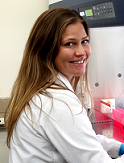Meet the Editors
Janine Scholefield, Editor-in-Chief
 What is your current position?
What is your current position?
Research group leader at the CSIR, Honorary Senior lecturer at UCT, and Editor-in-Chief of Gene Therapy
What is your "claim to fame"?
First person to start iPSCs in Africa (I think)
Why gene therapy?
I fell in love with mendelian genetics at school - to find an aspect of biological science with so much mathematical symmetry to it made it so beautiful to study. Then to find out that there were ways in which to harness this knowledge to change people's genetic mutations and treat untreatable diseases made it impossible to stay away from.
Discuss your career path in gene therapy thus far.
I loved genetics at varsity when I first understood that variations causing sickle cell contributed to protecting African individuals from malaria...I love using variations linked to founder mutations my predecessors had found in the African population, as an allele-specofoc target for spinocerebellar ataxia-7. During my postdoc I was exposed to advanced technologies such as induced pluripotent stem cells and then genome engineering that have catapulted gene therapy from science fiction to FDA approved treatments. So now our team gets to exploit these technologies to tackle making cellular models that are specific to Africa. Seriously, how lucky am I?
What research/paper/innovation would you consider groundbreaking or shifted the needle in gene therapy research?
Jinek et al. 2012. CRISPR.
We (scientists) had the viral delivery mechanism going well (the tank) and could carry the necessary molecular cargo (the necessary supplies needed to stop disease). Tweaks are still required, absolutely, and that’s why research that investigates what appear to be small improvements are so important. But after CRISPR it was as if we had the tank that could cross over any terrain and deliver the urgent supplies, but then CRISPR gave us the GPS coordinates to maximise the impact.
What has been your favourite gene therapy publication thus far? In your time as an editor and in all time.
For the record I have not read every paper Gene Therapy has ever published. However there are a few which bring me a smile for various reasons.
“Plat-E: an efficient and stable system for transient packaging of retroviruses” was published in 2000 and is our most cited paper of all time. Some people may consider these older papers as basic mechanics, and there have been many improvements but they provided us with workhorses in the field of gene therapy without which we would be significantly held back in moving towards the clinic.
"Excision of HIV-1 DNA by gene editing: a proof-of-concept in vivo study" was a concise study but addressed a much needed area of research moving towards removing the latent viral reservoir. Having previously demonstrated that CRISPR could be harnessed to remove the proviral genome in vitro, the study made the important next step of addressing how to deliver the necessary therapeutic cargo in vivo. Their results showed the success of such an approach and have been cited extensively in moving towards a functional HIV cure.
Since I've been an editor, "CRISPR/Cas9 increases mitotic gene conversion in human cells" really sparked my interest. It’s just an area of genome editing that I don’t believe gets as much attention as it deserves and so many more questions, such as those framed and addressed in this paper are needed. We may not yet know how important gene conversion is as we move towards the clinic but the mechanism is fascinating.
Who/What is your favourite gene therapy researcher, lab, company and/or organisation?
Researcher: Sally Cowley for her research etiquette, her constant teaching and ensuring she passes on her expertise.
Company: So many. So so many. My favourite is Cellectus.
What is your favourite application of gene therapy in the world? And why?
CAR-T. It may still have a long way to go, but from a point of view of making a big jump I’m really excited to see how this can shift the needle in treating cancer.
Which young researcher, lab, company and/or organisation is on your “watchlist”? And why?
I’d hardly call them underdogs but I’m very excited to see where Insitro goes. They appear to have a very progressive vision combining biology and machine learning, using so many of the techniques we publish at Gene Therapy. For me, they are a company to watch especially in terms of accessing genetic information to get better treatments to patients faster.
What ethical/legislative issue in gene therapy is of most concern to you? And why?
Gene editing of human embryos brought to term and accessibility. The former is something most scientists are concerned about and there are many eloquent debates in the public forum for why we need to tread carefully here. The latter is a global issue and relates to the way we do research. Diverse input is essential for good science so we start talking about how gene therapy treatments in different ethnic groups may have significantly different outcomes between populations because the very mutations targeted are varied. If those discussions could be held prior to developing expensive treatments for orphan diseases there is a chance we could cover a much broader range of the global population in a single effort.
